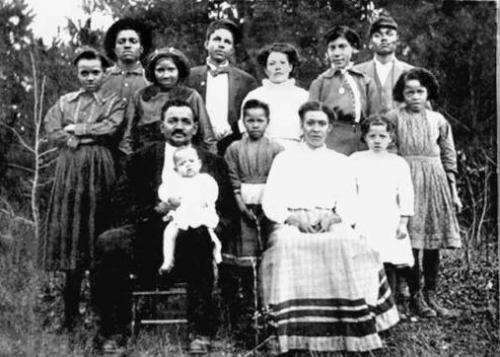Pioneer cemeteries. Just about every U.S. town has one lying at its outskirts, hinting at history and promising importance. Park your car and investigate, and, sure enough, you’re bound to find weathered tombstones of a suitably impressive age. That’s part of the formula.
But not everyone buried in a pioneer cemetery is an actual pioneer—right? There are always burials of a more recent vintage too. Are those newer arrivals pioneers-by-association? And does everyone who lived a century or more ago qualify as a pioneer simply because they came from Long Ago?
What exactly are communities trying to tell us when they put the “Pioneer Cemetery” label on their local burial grounds?
Our little cemetery in downtown Auburn had been in use for almost a century before the local citizenry decided to append the Pioneer Cemetery label to its name. In the early days it had been known variously as the Faucett Cemetery (after the family first known to bury its dead there) or the Slaughter Cemetery or Christopher Cemetery (both of which were early names for the Auburn area). After other near-by cemeteries opened, the original cemetery was often listed in newspapers simply as “the old cemetery.” We don’t know if any of these names were ever official enough to inspire signage; it’s more likely that the locals just knew which cemetery was being referred to, regardless of the name in use during their time.
Of course, as the local Japanese community grew, so too did their use of this cemetery. With the ever-increasing number of kanji tombstones, the cemetery eventually became known primarily as the Japanese cemetery.
It wasn’t until well after World War II that developers and city planners began to view the cemetery’s real estate with a hungry eye. Most of the white folks had been moved out to the cemetery up the hill. The local Japanese community had been decimated by their imprisonment in internment camps during the war; few had the means to return to Auburn after their release. With these facts in mind, it was assumed that no one would really mind if a wedge of land was shaved off the cemetery so that Auburn Way could be widened and straightened. Plans went into motion.
It was at this point that a local civic group with the best name ever—The Pioneer Daughters of Slaughter—got involved. After a careful survey of the remaining graves, they noted that not all of the city’s founders had been moved out. Several early families were still represented among the remaining graves that dotted the cemetery’s west side.
The Daughters of Slaughter rallied local support to preserve these important burials. It was at this time that a large bolder was placed in the cemetery—directly in the path of any earth-moving equipment that might be sent in to expand the adjacent road. Evidently the cemetery was patrolled at night to prevent any incursions that under-handed developers might attempt as concerned neighbors slept. And, to underline the point that the cemetery had historically significant graves, its name was officially designated as The Auburn Pioneer Cemetery.
In other words (according to the tenor of the times), the name was chosen to emphasize the fact that, despite initial impression, it wasn’t just insignificant Japanese burials that populated the cemetery. There were actually Christian burials too. Of important people. Upstanding, white people. Pioneers.
Sadly, during those days the term “pioneer” was anything but inclusive. It never would have been used in application to the Muckleshoot people who had settled the area long before any white people showed up. It never would have been applied to the black people who came to the area and helped establish the coal mines that once flourished here (some of whom are pictured in the photo above). And it would never have been used to describe the Japanese people who came here to make Washington their home.
It seems appropriate today, as the country celebrates its independence and more than two hundred years of freedom, that we pause to remember the literal meaning of the term “pioneer”: A person who is among those who first enter or settle a region, thus opening it for occupation and development by others.*
It’s a broad definition, and makes no distinction based on race or religion. Let’s make it our business to respect the memories of all of our pioneers–even those who never had the chance to claim the title in their lifetimes. Our cemeteries are full of them.
* as defined by Dictionary.com.
